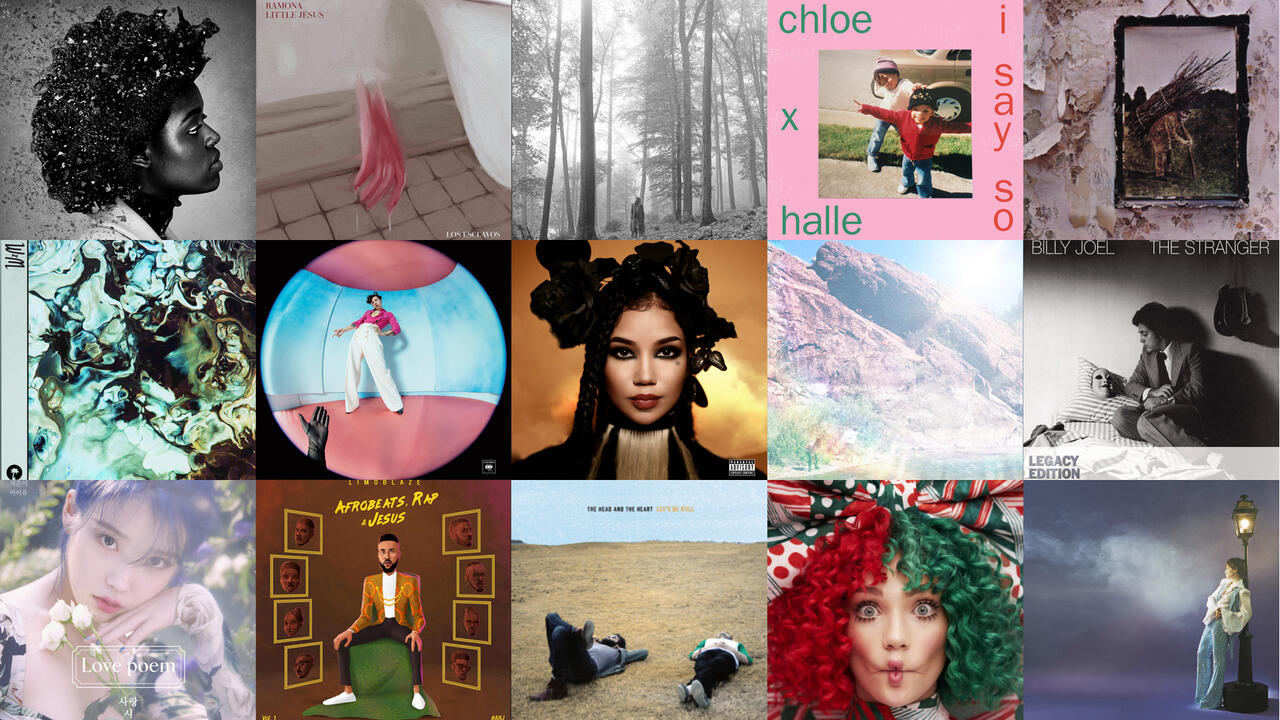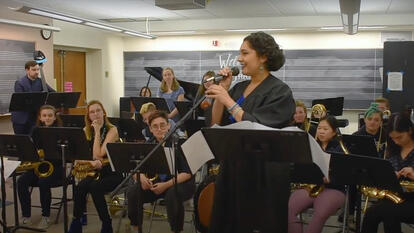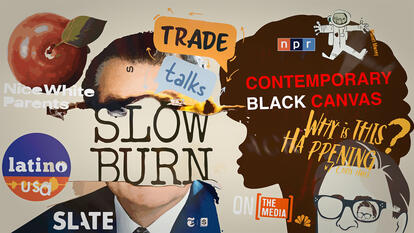
Music for Our Times—What Wellesley Students and Faculty Are Listening to Right Now
Liseli Fitzpatrick’s excitement about music comes through clearly in her email. “It is vital!” the visiting lecturer in Africana studies wrote. “Music is the engine and pulse of life, literally. The very essence of our existence is driven by, and dependent on, the drum beat of our hearts and the dynamic cadence of nature. For me, music is everything and everywhere. It is life-giving—I will be nothing without it.”
In a time when the pandemic, climate change, and civil unrest are overwhelming our communities, a force like music can be grounding, cathartic, and comforting.
Here, some of Wellesley’s faculty and students share why music is especially important to them these days and recommend some of their favorite tracks. Listen to some of the tracks listed below as well as others recommended by the Wellesley community by visiting this Spotify playlist.
What purpose has music served for you this year?
Mala Radhakrishnan, associate professor of chemistry: I honestly don’t know how I would make it through these times without music. Whether it’s listening (and singing) to music while cooking or while taking that much-needed walk to get a change of atmosphere, music helps me “interact” with something outside myself when I’d otherwise feel alone. It’s been such a great way for me to enjoy time with my kids and connect with them in a meaningful way, as they both play the violin. Each day we spend time playing music together, and it is both relaxing and rejuvenating. We can express ourselves in different ways, and we can work together to create something beautiful that can help us feel and remember that we’re human.
Gina Maria Fiore ’24: Whatever music I’m listening to or playing often reflects how I’m feeling at the time. I really enjoy listening to a variety of music, so sometimes I listen to music to relax, other times to pump me up, as a soundtrack for when I’m feeling happy, or when I’m feeling sad. Playing the piano and making music myself is also really important to me. It is a great stress reliever, and I love the challenge of working on a new piece.
.name {display:none;}
Hannah Ryu ’23: I believe music is not only valuable to a musician, but that it is, or should be, valuable to everyone in the world. I say this not because I love music myself, but because I truly find music to be a universal language. Especially through my liberal arts education at Wellesley, I grow to value music more as I realize its importance in various fields of study, whether it is in Shakespeare’s plays such as Twelfth Night, in studies of bird songs in organismal biology, in its effects on memory in psychology, in comparisons between The Berlin Stories and its film adaptation Cabaret, and in my cultural studies of French and Spanish, just to name a few. Through noticing music in various topics, not only do I come to understand the power and relevance of music, but also, I value my interdisciplinary study more.
What kind of music have you been listening to?
Fitzpatrick: I listen to a lot of old-school classics, soul, calypso, soca, rapso, parang (genres indigenous to my home country of Trinidad), reggae, dancehall, zouk, jazz, R&B, spirituals, and the awakening and enchanting sounds of nature—children at play, rain, chirping birds, rolling thunder, rustling leaves, and swirling winds. Recently, I encountered neo soul artist Tawiah—so so so good!
Radhakrishnan: I cast a wide net when it comes to what I listen to—pop, alternative, rap, classical, Carnatic music from India, and many things in between. I’ve mainly been playing classical music, though—and mainly accompanying my kids as they play Handel sonatas, Bach gavottes, etc. Occasionally my son and I will play the Bach double violin concerto together too (or at least the first movement). Toward the beginning of the pandemic, I recorded a parody version of a Simon and Garfunkel song with COVID-related lyrics written by a friend (it’s on YouTube somewhere, actually)—that was somewhat therapeutic, and again a way to try to find some sort of joy during these difficult times.
Efe Balikçioğlu, visiting lecturer in religion: I have been collecting records and cassettes since my high school years, and during the pandemic, I finally found the time to discover a lot of interesting subcultures from different parts of the world…I have been listening to a lot of North African raï, a contemporary music phenomenon that originated in Algeria with some roots in the female (sheikha) singing tradition of the 1920s. I have also been listening to the cassette tapes of Chaba Zahouania, Cheb Sahraoui, and Houari Benchenet. I also admire Cheb Khaled’s synth-pop raï album with the celebrated jazz composer Safy Boutella titled Kutché. I love the Moroccan folk-pop singer Saida Fikri. I particularly like the music of the Iranian actress and singer Marjan, who passed away very recently, as well as anything by the Iranian sitar and santur master Mehrpouya.
Fiore: The Hamilton soundtrack, Harry Styles’ Fine Line album, and anything (basically everything!) by the Grateful Dead.
Ryu: I usually listen to music that I am currently playing (as one would expect a classical musician to do), such as Chopin’s “Ballade No.1” or Paganini’s “Caprice No. 24.” But especially as I spend more time at home these days, I find myself exploring various other types of music, including movie music, such as the theme song from Schindler’s List, or even K-pop, such as “Life Goes On” and “Dynamite” by BTS. In addition to enjoying the raw music, diving deeper into the meanings or lyrics of those songs has been a consoling experience.
Catrina Chen ’21: I’ve fallen into a bit of a Madonna phase—the musicians that my parents instilled in me were Prince, Madonna, and Michael Jackson. As I’ve become independent, I’ve gotten into glam rock on my own. Recently, I’ve been listening to the One Direction album Made in the A.M., Positions by Ariana Grande, Fleetwood Mac, and the Beach Boys.
What songs and/or albums would you recommend?
Chen: “God Only Knows” by the Beach Boys, “Vienna” by Billy Joel, “Olivia” by One Direction, and “At Last” by Etta James.
Ryu: As we are getting into the holiday season, The Nutcracker by Tchaikovsky would be a delightful and warming piece to listen to, especially if you watch or imagine (or dance yourself, which is even better) the ballet that goes along with it! A combination of traditional symphonic form with popular 1900s African-American music, William Grant Still’s Afro-American Symphony is a stunner! Infused with fun rhythms and instrumentation, and blues-inspired harmonies and melodies, I am sure it will make you sing or hum along!
Fitzpatrick: I would be delighted to discuss and share music recommendations with anyone who expresses a desire or interest. My appetite for music and collection are both expansive. It’s a virtual challenge to limit my recommendation. Music is medicine and food. I would have to feel your pulse in order to prescribe music (chuckle). Really, music revolves around the mood and need of an individual or community.
Balikçioğlu: I love the Iranian pop singer Googoosh. She is such a gem! The British record label Finders Keepers issued a very nice compilation of her early work, which includes my favorite song, “Divorce” (Talagh). Together with my colleagues Lidwien Kapteijns, Elizabeth Kimball Kendall and Elisabeth Hodder Professor of History, and Rachid Aadnani, senior lecturer in Middle Eastern studies, I am planning to organize a radio event where we will introduce past and present voices and tunes from North Africa and the Middle East. You are all welcome to our anticipated event, called Radio North Africa/Middle East, in terms 3 and 4!


